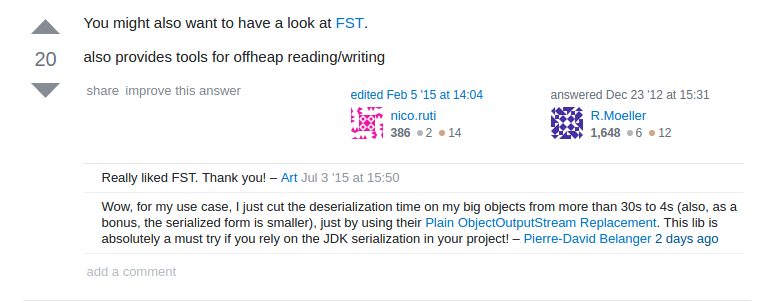fast-serialization
- up to 10 times faster 100% JDK Serialization compatible drop-in replacement (Ok, might be 99% ..). As an example: Lambda Serialization which came with 1.8 worked instantly.
- Android compatible since version >= 2.17 (use
FSTConfiguration.createAndroidDefaultConfiguration()both on server and client side. The configuration object has to be passed into FSTObjectIn/Output constructors) - OffHeap Maps, Persistent OffHeap maps
- FSTStructs is very similar to IBM's packed objects. Difference is: You can run it with Oracle JDK today.
- optionally en/decode any Serializable object graph to JSON (incl. shared references) (since 2.29) for interop
- Apache 2.0 license since 2.17
Docs:
Fast JDK-compatible Serialization
MinBin cross platform binary format
mvn
note: maven.org might lag 1 day behind after releasing.
3.0.0 version (requires java 14, "--add-modules jdk.incubator.foreign" option on compiler and runtime)
<dependency>
<groupId>de.ruedigermoeller</groupId>
<artifactId>fst</artifactId>
<version>3.0.1</version>
</dependency>
2.0 version (java 8)
<dependency>
<groupId>de.ruedigermoeller</groupId>
<artifactId>fst</artifactId>
<version>2.56</version>
</dependency>
jdk1.6 compatible build of fst 2.x
<dependency>
<groupId>de.ruedigermoeller</groupId>
<artifactId>fst</artifactId>
<version>2.48-jdk-6</version>
</dependency>
1.x version (different package name, 1.6 compatible ..). Fixes are not backported anymore, unsupported.
<dependency>
<groupId>de.ruedigermoeller</groupId>
<artifactId>fst</artifactId>
<version>1.63</version>
</dependency>
Who uses FST ?
I am not actively tracking use, maven.org reports more than 14000 downloads from 6000 distinct IP accesses triggered by maven builds world wide per month.
Notable also:
- used in production in Eurex Exchange's trading back end's middleware
- JUptr.io's distributed system / NLP engine uses FST
- Popular Apache Wicket supplementals use FST to speed up Wicket
how to build
- master contains dev branch/trunk.
- 1.x contains old version
- The maven build should work out of the box and reproduces the artifact hosted on maven.org
- To use the gradle build, you need to configure the proxy server in settings.properties (or just set empty if you do not sit behind a proxy).
Note that instrumentation done for fst-structs works only if debug info is turned on during compile. Reason is that generating methods at runtime with javassist fails (probably a javassist bug ..). This does not affect the serialization implementation.
JDK 1.6 Build 1.x build since v1.62 are still jdk 6 compatible




